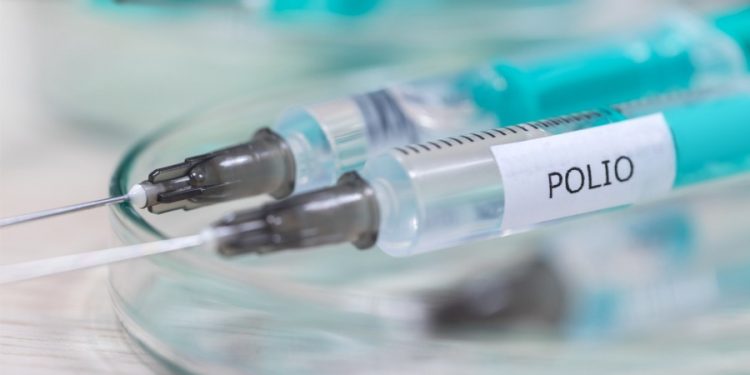Dogs…most of the time they serve as our lovable companions, but they can misbehave from time to time. Though perhaps not as badly as this pooch who wielded a knife at his dog walker.
Today in health, a disaster was declared in New York due to the detection of polio in the state’s wastewater, bolstering ongoing vaccination efforts.
Welcome to Overnight Health Care, where we’re following the latest moves on policy and news affecting your health. For The Hill, we’re Nathaniel Weixel and Joseph Choi. Someone forward you this newsletter? Subscribe here.
Hochul declares polio emergency in NY
New York Gov. Kathy Hochul (D) declared a “disaster” in the state on Friday due to the spread of polio through wastewater.
The emergency declaration allows a larger group of medical personnel to administer polio vaccines and requires providers to send immunization data to the New York State Department of Health.
“On polio, we simply cannot roll the dice,” State Health Commissioner Mary
T. Bassett said in response to Hochul’s order.
She continued: “If you or your child are unvaccinated or not up to date with vaccinations, the risk of paralytic disease is real. … Polio immunization is safe and effective — protecting nearly all people against disease who receive the recommended doses.”
Vaccine boost: The state’s polio immunization drive will be bolstered by the New York State Immunization Information System, which will collect data on which communities need access to vaccines the most.
The vaccination rate against polio among 2-year-old children in New York is
79 percent and “significantly less than that in several counties and zip codes,” according to the governor’s office.
Polio vaccines will now be able to be distributed by first responders, midwives and pharmacists.
Read more here.
NIH launches trial testing efficacy of monkeypox drug
The National Institutes of Health (NIH) is launching a Phase 3 clinical trial to determine the efficacy of tecovirimat — the smallpox antiviral better known as TPOXX — for use in treating monkeypox, as current data on its effectiveness against the virus is limited.
The National Institute of Allergy and Infectious Diseases (NIAID) is sponsoring the trial, which is being led by the organization’s AIDS Clinical Trials Group. The study is currently enrolling adults and children who have been infected with monkeypox in the U.S.
Off-label use: TPOXX was approved by the Food and Drug Administration (FDA) in 2018 to treat smallpox. It was authorized for use in treating monkeypox in August based on studies treating orthopoxviruses, the family of viruses that both monkeypox and smallpox fall under.
TPOXX has not been approved for use in monkeypox but has been designated as an “investigational” drug so that it can be used to treat monkeypox.
“Monkeypox can be an extremely painful infection that lasts for weeks,” NIAID Director Anthony Fauci said in a statement.
“We currently lack efficacy data that would help us understand how well this drug may mitigate painful monkeypox symptoms and prevent serious outcomes,” said Fauci. “This clinical trial was designed to answer those important questions.”
Who’s been treated: According to federal data, nearly 2,000 patients diagnosed with monkeypox have been treated with TPOXX so far, nearly all of them men. Only 24 women have been confirmed to have received TPOXX to treat monkeypox infections.
Read more here.
SOUTH CAROLINA SENATE REJECTS NEAR-TOTAL ABORTION BAN
The South Carolina Senate failed to pass a ban on abortions earlier than six weeks into pregnancy on Thursday.
The controversial bill was altered over two days of debate on the floor, moving it closer to the current South Carolina abortion ban that is tied up in court.
“This is not where I wanted to be. I was hoping we’d be more aggressive, but it’s clear to me the votes are not there in the Senate for an abortion ban before six weeks,” said state Senate Majority Leader Shane Massey (R) in response to the two days of debate over the initial proposal.
The altered law, passed by a 27-16 vote, joins the state’s current abortion law in banning abortion after six weeks, at which point fetal cardiac activity can be detected by ultrasound. The law will require doctors to collect DNA samples from aborted fetuses to aid law enforcement in prosecuting rapists.
The “fetal heartbeat” law was passed last year but only took effect after the Supreme Court’s decision in Dobbs v. Jackson Women’s Health Organization overturned Roe v. Wade.
The law was suspended by the South Carolina Supreme Court this summer for potentially violating the state constitution.
Read more here.
WOMEN ARE UNDERREPRESENTED IN AUTISM RESEARCH
Women tend to be excluded from studies on autism and this disparity can hinder accurate diagnoses and the development of useful interventions for both women and girls.
That’s according to researchers at the Massachusetts Institute of Technology (MIT) who carried out an investigation on a commonly used screening test, the Autism Diagnostic Observation Schedule (ADOS).
Researchers found that in a sample of 145 adults who already had a preexisting community diagnosis of autism — received from a general medical practitioner, neuropsychologist, and/or a mental health provider — the tool excluded autistic females at a rate more than 2.5 times higher than that of autistic males.
Although males are four times as likely as females to be diagnosed with the condition, recently experts have called for more female representation in studies which in the past have included small female sample sizes or excluded the patients altogether.
Because of this, female diagnoses could be missed altogether and an already small pool of study subjects is further reduced.
Read more here.
FDA issues safety alert for breast implant patients
The Food and Drug Administration (FDA) issued a warning for doctors and patients on Thursday after it received reports of people with breast implants being diagnosed with multiple types of cancer.
Binita Ashar, the director of the Office of Surgical and Infection Control Devices in the agency’s Center for Devices and Radiological Health, said in a release that the FDA received reports of squamous cell carcinoma and various lymphomas in the capsule or scar tissue near the implants.
Ashar said the FDA reviewed the reports and determined that such occurrences are rare, but the agency wanted to provide “clear and understandable information” to the public as soon as possible.
“Our collective understanding has advanced significantly because of the efforts to study, communicate and act when needed,” she said. “As the agency moves further into adopting modernized approaches to our regulatory responsibilities to promote faster science-based decision-making, accurate data is crucial.”
She said these reports are separate from breast implant-associated anaplastic large cell lymphoma, which the FDA started warning about more than 10 years ago.
Ashar said the agency does not have enough information to conclude if the implants cause certain cancers or if some implants pose a higher risk than others. Any instances of squamous cell carcinoma, lymphoma or any cancer near the scar tissue around breast implants should be reported to the FDA as a result.
Read more here.
EVENT INVITE
Unlocking Access to Oral Health, Tuesday, Sept. 20 at 8 a.m. ET
A healthy mouth is essential for a healthy body. Yet, access to adult oral health care is inconsistent or inaccessible for millions of low-income adults enrolled in Medicaid across the country. Is there a connection between oral health benefits in public programs like Medicaid and health equity? Join The Hill for a discussion on what more can be done to improve oral health nationwide. RSVP today to attend in-person or receive the livestream link.
WHAT WE’RE READING
FDA funding negotiations heat up ahead of September deadline (Stat)
US records milestone 1 millionth organ transplant (ABC News)
Lawmakers seek U.S. probe on airline handling of COVID funds (Reuters)
STATE BY STATE
Many preventive medical services cost patients nothing. Will a Texas court decision change that? (Kaiser Health News)
L.A. County investigating death of resident diagnosed with monkeypox (Los Angeles Times)
In Michigan, rallies, a court ruling and voters newly fired up over abortion (The 19th News)
THE HILL OP-EDS
‘Potent Pot’ hysteria takes a page from the Reefer Madness playbook
State lines should no longer be barriers to health care
How the US monkeypox response failed to learn COVID’s lessons
🏎 Lighter click: The Hill’s Photos of the Week
That’s it for today, thanks for reading. Check out The Hill’s Health Care page for the latest news and coverage. See you next week.
VIEW FULL VERSION HERE














